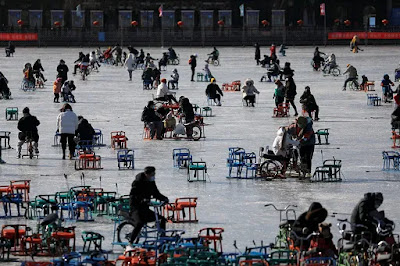MANILA - Asian shares stumbled on Tuesday though the dollar regained firmer footing, after disappointing data cast doubt on the strength of the U.S. economy and gave investors little reason to hope for stability in emerging markets after their recent rout.
MSCI's broadest index of Asia-Pacific shares outside Japan fell about 1.4 percent, touching its lowest level since early September at one point and flirting with its biggest one-day decline since August. But the greenback's descent took a breather, with the dollar index gaining 0.2 percent to 81.164.
Hong Kong shares, reopening on Tuesday after the Lunar New Year holiday, caught up with plunges elsewhere. Mainland Chinese markets remained shut for the holiday and will reopen on Friday.
"Experienced emerging market investors would be looking at this selldown with great interest, looking to pick up quality names on the dip, but they are still in the minority for now," said Erwin Sanft, Standard Chartered's Hong Kong-based China equity strategist.
Japan's Nikkei stock average lost 3.3 percent, extending its declines into a fourth session, breaking below the key technical 200-day moving average for the first time since November 2012 and bringing losses for this year to around 13 percent.
That makes it the worst performer among major developed markets since the start of 2014, with the S&P 500 down 5.8 percent and the pan-European FTSEurofirst 300 down 3.3 percent. The sharp drop came even after the Bank of Japan bought 123 billion yen ($1.21 billion) worth of exchange traded funds this year as of February 3 to support the equities market.
Data showing U.S. manufacturing activity slowed sharply last month dealt a heavy blow to markets already worried that the U.S. Federal Reserve's decision to taper its asset purchases would lead to capital flight from emerging markets.
"Investors should steer clear of risk assets over the short term as the turmoil does not look like it will be over anytime soon," Mitul Kotecha, the Hong Kong-based head of global foreign exchange strategy for Credit Agricole, said in a note to clients.
"A combination of tapering, a confluence of country- specific emerging market concerns and weaker growth in China provide the backdrop for a volatile few weeks, if not longer, ahead," Kotecha added.
The yield on benchmark 10-year U.S. Treasury notes stood at 2.589 in Asian trading, after falling as low as 2.582 percent on Monday, the lowest since November 1.
January's sharp fall in U.S. output activity came on the back of the biggest drop in new orders in 33 years, while construction spending barely rose in December, suggesting the U.S. economic recovery is more tenuous than some investors had believed.
The data pushed the benchmark S&P 500 index into its worst single-day drop in seven months, while the CBOE volatility index soared 16.5 percent to close at its highest level since December 2012.
That helped send the dollar as low as 100.77 yen and the euro as low as 136.37 yen, levels neither pair had touched since late November.
In Asian trading, the dollar took back some lost ground, adding about 0.3 percent to buy 101.24 yen, while the euro rose 0.1 percent on the day to 136.75 yen.
The Australian dollar rallied after the Reserve Bank of Australia dropped its easing bias in the first policy review of the year, encouraging markets to increase the chance of an interest rate hike.
The Aussie was last up 1.5 percent at $0.8877 after the RBA also toned down its rhetorical campaign for a weaker currency.
On the commodities front, U.S. oil edged up slightly to $96.62 a barrel, after plunging $1.09 on Monday, as the weaker-than-expected U.S. factory data fanned fears about demand in the world's largest economy.
March Brent crude firmed slightly to $106.04 a barrel after two straight sessions of losses.
The stock market selloff added to the safe-haven appeal of gold, with spot gold steady on the day at $1,259.15 an ounce, after gaining 1.1 percent on Monday.
But three-month copper on the London Metal Exchange edged down to $7,034.75 a tonne after earlier hitting a two-month low and on track for its tenth straight losing session.
source: interaksyon.com





